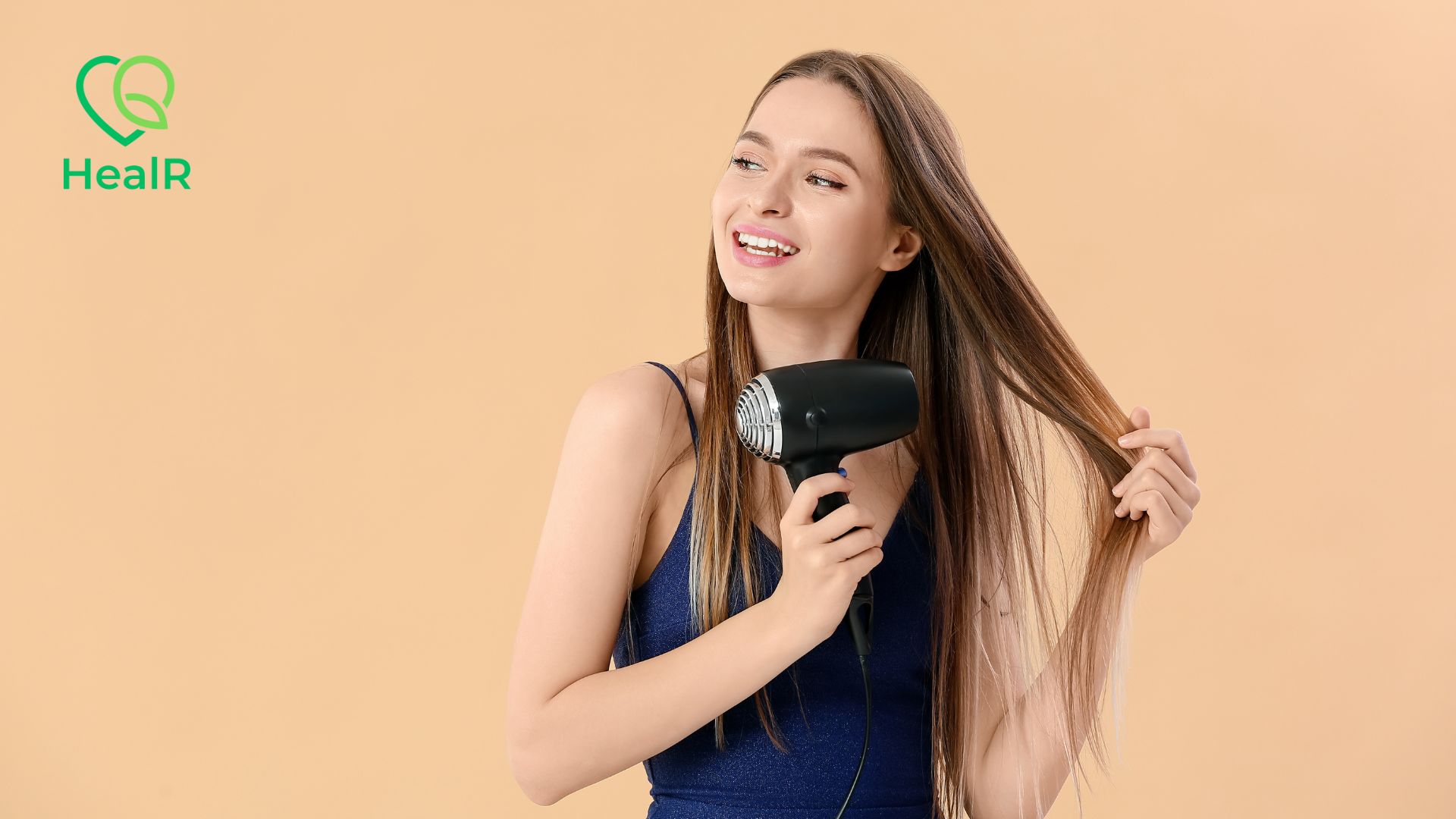Key Takeaways: Does Hair Dryer cause Hair Fall?
| Key Takeaways | Details |
|---|---|
| Hair dryers don’t directly cause hair loss | Improper use can lead to hair damage, breakage, and the appearance of thinning hair, but hair dryers don’t directly affect hair follicles. |
| High heat settings can cause damage | Excessive heat can weaken the hair’s protein structure, leading to dry, brittle, and breakage-prone hair. |
| Mechanical stress can harm hair | Rough handling, such as aggressive brushing while drying, can cause physical damage to hair shafts and follicles. |
| Excessive heat can dry out the scalp | Overexposure to heat from hair dryers can lead to scalp dryness, irritation, and potential hair loss. |
| Use heat protectants | Applying a heat protectant spray or serum before drying creates a barrier between the heat and your hair, reducing the risk of damage. |
| Keep the dryer at a safe distance | Hold the hair dryer at least 6 inches away from your hair and constantly move it around to distribute heat evenly and prevent overheating. |
| Start with low heat settings | Begin drying your hair using the lowest heat setting to minimize damage and allow your hair to adjust to the drying process. |
| Avoid over-drying | Once your hair is mostly dry, turn off the dryer and let your hair air dry naturally to prevent excessive dryness, frizz, and breakage. |
| Consult professionals for significant hair loss | If you experience notable hair loss or thinning, consult a dermatologist or trichologist to diagnose any underlying health conditions or genetic factors. |
Table of Contents
Does Using a Hair Dryer Cause Hair Loss?
Hair dryers are a common styling tool that many of us rely on for quick and easy hairstyling. However, there’s a persistent concern that using a hair dryer might lead to hair loss. In this blog post, we’ll explore the potential link between hair dryers and hair fall, and provide tips on how to minimize damage while using this handy tool.
Understanding Hair Dryer Damage
While hair dryers don’t directly cause hair loss, improper use can lead to hair damage, which may contribute to breakage and the appearance of thinning hair. Here’s how:
- Heat Damage: High heat settings can weaken the hair’s protein structure, leading to brittle, dry, and breakage-prone hair.
- Mechanical Stress: Rough handling, such as pulling or brushing hair aggressively while drying, can cause physical damage to the hair shafts and follicles.
- Scalp Dryness: Excessive heat exposure can dry out the scalp, leading to irritation and potential hair loss.
It’s important to note that hair dryers cause hair shaft damage rather than directly affecting the hair follicles. This means that while you may experience breakage and the appearance of thinning, the hair will typically grow back once the damaging practices are stopped.
Tips for Minimizing Hair Dryer Damage
To keep your hair healthy while using a hair dryer, follow these best practices:
- Use Heat Protectants: Apply a heat-protectant spray or serum before you begin drying your hair to shield your strands from the damage of high temperatures. This creates a barrier between the heat and your hair, reducing the risk of damage.
- Keep Your Distance: Hold the hair dryer at least 6 inches away from your hair to avoid excessive heat exposure. Constantly move the dryer around to distribute the heat evenly and prevent overheating any particular area.
- Start with Low Heat: Begin drying your hair using the lowest heat setting. This gentle approach helps minimize heat damage and allows your hair to adjust to the drying process.
- Don’t Over-Dry: Once your hair is mostly dry, turn off the dryer and allow your hair to air dry naturally. Over-drying can lead to excessive dryness, frizz, and breakage.
- Use the Right Attachments: If you have curly hair, use a diffuser attachment to enhance your natural texture while minimizing frizz and damage.
| Do | Don’t |
|---|---|
| Use heat protectants | Use high heat settings |
| Keep the dryer 6 inches away | Over-dry your hair |
| Start with low heat | Use the dryer on dripping wet hair |
| Allow hair to air dry at the end | Brush aggressively while drying |
When to Seek Professional Help
If you’re experiencing significant hair loss or thinning, it’s essential to consult with a dermatologist or trichologist. While hair dryers can contribute to hair damage, there may be underlying health conditions or genetic factors at play, such as:
- Androgenetic Alopecia (Male or Female Pattern Baldness)
- Alopecia Areata
- Nutritional Deficiencies
- Hormonal Imbalances
A professional can help diagnose the cause of your hair loss and recommend appropriate treatments, which may include medications, lifestyle changes, or hair restoration procedures.
The Bottom Line
While hair dryers don’t directly cause hair loss, improper use can lead to hair damage and breakage, giving the appearance of thinning hair. By using heat protectants, keeping the dryer at a safe distance, and avoiding high heat settings, you can minimize the risk of damage and maintain healthy, lustrous locks. If you’re concerned about significant hair loss, don’t hesitate to seek professional advice to address any underlying issues.

